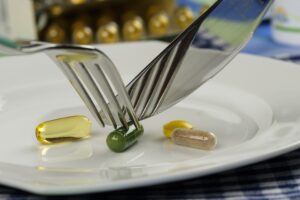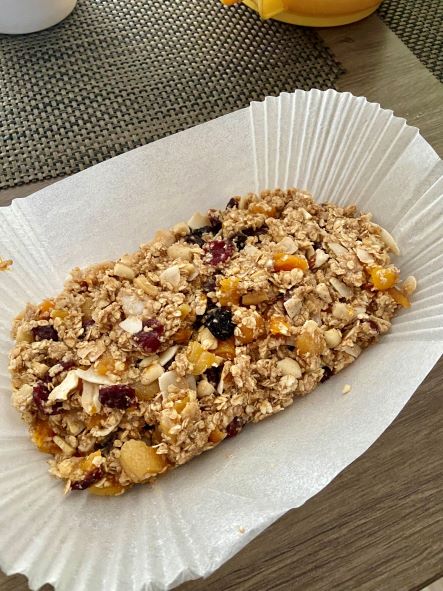If you’re a pro ballerina (or prima in training) I can pretty much guarantee that at some point(e) you’ll have been preached at by a teacher telling you to cut the junk food and eat vitamin-rich foods instead??? Although it doesn’t always sound as yummy as binging on a thick-crust pizza or a bowl of chips, ingesting vitamins via your food or as supplements is essential nutrition for dancers, and can actually help to improve your performance and reduce the risk of injury! But which vitamins and minerals do YOU need to be taking? Carry on reading to find out which are the best vitamins for dancers…
Unlike the big boys in the nutrient business (our carbs, protein and fats), vitamins themselves don’t actually supply our bodies with energy. Instead, the help our bodies to convert our food into glycogen, which we then use as energy to help get us through grand allegro!
Let’s face it… there are A LOT of vitamins out there, so how do we figure out which ones we actually need?
Although we should try to eat as much vitamin-rich food as possible, there are certain vitamins which are especially valuable to dancers because of their specialised properties. These properties can range from maintaining the function of our anaerobic and aerobic energy systems, to strengthening our bones to help prevent stress fractures which tend to be common in dancers (especially from long hours dancing en pointe)!
Read on to find our which are the best vitamins for dancers, as well for some handy tips to help you decide which supplements you should pop into your shopping basket the next time you hit the supermarket shelves…
Why do dancers need vitamins, and is it true that they’re lacking in my food?
Before we start, allow me to dive into a quick scientific explanation to help you understand why your body needs vitamins and minerals…
Vitamins and minerals are otherwise known as micronutrients, and although they are essential for our health, we need to ingest them in much lesser quantities than we do the macronutrients (fats, proteins and carbs).
Vitamins and minerals are coenzymes (or cofactors). This means that they help the enzymes which break down the food we eat to do their job. Every enzyme is assigned to a macronutrient, and they often require the presence of a certain vitamin or mineral to be able to carry out their role effectively.
As an example, allow me to transport you all the way back to high school biology… You may remember that amylase is the enzyme used to break down carbohydrates? Well, did you know that amylase needs the mineral calcium to help it break down all that pasta? That’s right, you guessed it; this makes calcium a cofactor for the amylase enzyme!
But why do dancers need vitamins?
There are certain vitamins and minerals that dancers can use to enhance their performance both on stage and in class! For example, since Vitamin C helps with collagen synthesis (collagen is a protein used to connect structures in the body such as bones and tendons), our body will be more able to maintain strength to prevent injury! This means that by making sure you are always ingesting the best vitamins for dancers, you will be making a worthy investment into your health and the longevity of your career.
Every day, more and more of us start opting to take vitamins in the form of supplements to make sure that we’re getting all the nutrients we need. But how do you know whether YOU should hop on the supplement train too?
The truth is, we don’t all need to take vitamin supplements, and you’ll probably know already if you’re someone that does need to start popping the pills! Have a think about your diet… are you consuming lots of fruit and veggies and always opting for complex carbs and unsaturated fats? In other words, would you consider yourself to be a glowing, healthy individual? If so, then well done, that’s great! However, if you’re sat behind your phone screen looking a bit ashamed right now, then a multivitamin is probably a good option for you!
What you should look for when purchasing vitamins and minerals
Real or Fake?
It’s worth putting a little extra effort into your meal planning to try and source vitamins from the food you eat rather than via supplementation. This is because our food is packed with natural coenzymes. These help us to catabolise (or break down) our vitamins and minerals as effectively as possible, making sure than we are absorbing as many nutrients as we can!
When vitamins contain their natural coenzyme, we say that the vitamin is in its ‘bioactive form’.
Unfortunately, many manufacturing companies choose to produce vitamin supplements which aren’t in their bioactive form, as these are often cheaper alternatives to the real thing that they can sell for the same price to unsuspecting customers!
Before purchasing your vitamin supplement, you should always do a little bit of research to check that the product you are buying is in its bioactive form, otherwise our bodies can struggle to absorb them, making the product an expensive waste of time.
- For example, if you’re looking to purchase a Vitamin B1 supplement, you must check that the product contains thiamine pyrophosphate (Vitamin B1’s bioactive form). Many companies choose to use Thiamine Mononitrate instead, which is a synthetic version of Thiamine Pyrophosphate associated with various health concerns.
Ever heard of the term ‘expensive urine’? This phrase comes from the idea that fake versions of a vitamin’s bioactive form can be difficult for our bodies to absorb. This means that to get rid of them, we will often just pee them out! Talk about throwing money down the toilet…

What about GMO?
As soon as you see ‘GMO’, immediately start looking for an alternative product. Genetically Modified Organisms are believed to have the potential to cause toxicity within the body, which can lead to problems surrounding our organ function. Just remember, natural is always best!
What else should my product contain?
Many manufacturers choose to pump their products up with E Numbers, bulking agents and gluten. This is especially true for multivitamins intended for kids, who will be more tempted to take the tablet if it looks attractive and sweet-like. However, some of these substances (which are often used as they can extend the product’s shelf-life) are unnecessary, and many of them have even been known to result in unwanted side effects such as hyperactivity, sickness and headaches- something you really don’t want to be suffering from in the midst of Nutcracker season.
Which are the Best Vitamins and Minerals for Dancers?
There are various vitamins and minerals that are valuable to dancers in different ways, and ingesting these regularly can really help you to improve performance and prevent injury!
**FRIENDLY DISCLAIMER- ALL THE INFORMATION PROVIDED BELOW IS TO BE USED AS A GUIDE-LINE ONLY. ALWAYS CONSULT A DOCTOR, REGISTERED DIETICIAN OR THE PRODUCT INFORMATION FOR TAILORED NUTRTIONAL ADVICE SPECIFIC TO YOURSELF OR BEFORE TAKING A SUPPLEMENT**
VITAMIN: Vitamin B1 / Thiamine
FUNCTION: Helps us to break down macronutrients to create glycogen (energy)
BENEFIT TO DANCERS: Enables dancers to perform at their best without tiring
SOURCES: nuts, oranges, beef, kale, B1 fortified cereals
VITAMIN: Vitamin B2 (riboflavin)
FUNCTION: Aids in the production of red blood cells which carry oxygen used for respiration during exercise
BENEFIT TO DANCERS: Helps to maintain a dancer’s energy levels when performing
SOURCES: almonds, milk, beef, pork, chicken
VITAMIN: Vitamin B6
FUNCTION: Assists in the breakdown of food to provide energy for dancers to train and rebuild body tissues
BENEFIT TO DANCERS: Element of haemoglobin which is responsible for transfer of oxygen in red blood cells for respiration
SOURCES: meat, fish, poultry, eggs, beans, whole grains, seed, peanuts
VITAMIN: Vitamin B12
FUNCTION:
1. Helps deliver oxygen to tissues
2. Reduces likelihood of developing anaemia
3. Beneficial for mental health
BENEFIT TO DANCERS:
1. Helps dancers perform for longer without becoming fatigued
2. Anaemia could result in a dancer becoming too weak to perform. Vitamin B12 helps to prevent this.
3. It’s important for dancers to maintain good mental health to help combat the mentally challenging aspects of the job (e.g. long hours, body image concerns etc)
SOURCES:
-the only source of B12 is animal produce (e.g. eggs, milk, meat)
-dancers following diets which lack in animal produce may wish to eat B12 fortified foods
VITAMIN: Folate
FUNCTION: Assists in growth of new tissues and proteins
BENEFIT TO DANCERS:
1. Helps us to develop the strength we need to perform at our full potential
(Especially important for male dancers looking to build muscle mass for pas de deux etc.)
SOURCES: enriched cereal, dark greens (e.g. kale and spinach), chickpeas
VITAMIN: Vitamin C
FUNCTION:
1. Supports immune system
2. Assists in collagen synthesis (connective protein which holds bones/ muscles/ tissues together)
3. Aids in the strength of blood vessels
BENEFIT TO DANCERS:
1. Helps dancers to remain healthy and ready to perform
2. Helps to create strong muscles/tendons etc. to meet physical demands of ballet and reduce chance of injury
3. Helps to reduce bruising from injuries which occur during ballet
SOURCES: citrus fruits, strawberries, peppers, tomatoes, broccoli, potatoes
VITAMIN: Vitamin D
FUNCTION: Crucial for skeletal health and bone protection
BENEFIT TO DANCERS: Helps to reduce the risk of injury in dancers (especially when engaging in pointe-work or demanding allegro which leave bones susceptible to breakages)
SOURCES: manufactured internally if exposed to sun light
fortified products, cod-liver oil, fish, eggs, red meat
Final thoughts on… The best vitamins for dancers; why do dancers need vitamins and minerals?
We all need to take our vitamins, but as dancers there are certain vitamins and minerals which can be extra beneficial to us as they can help to improve our performance both in class and on the stage!
Have a think about your diet and food choices… do you eat enough red meat or dark, leafy greens??? If not (and you’re not keen on adding these foods to your plate), maybe you should consider taking a multivitamin to make sure that you’re not compromising your career or training through poor nutrition!
However, if you are looking to supplement your diet with multivitamins, remember to check that the product you are buying includes the bioactive form of each vitamin, is non-GMO and doesn’t contain any harmful additives!
**FRIENDLY DISCLAIMER: All information, guidance or advice provided on this site is for informational and educational purposes only. The use of this information is at your own risk. **

